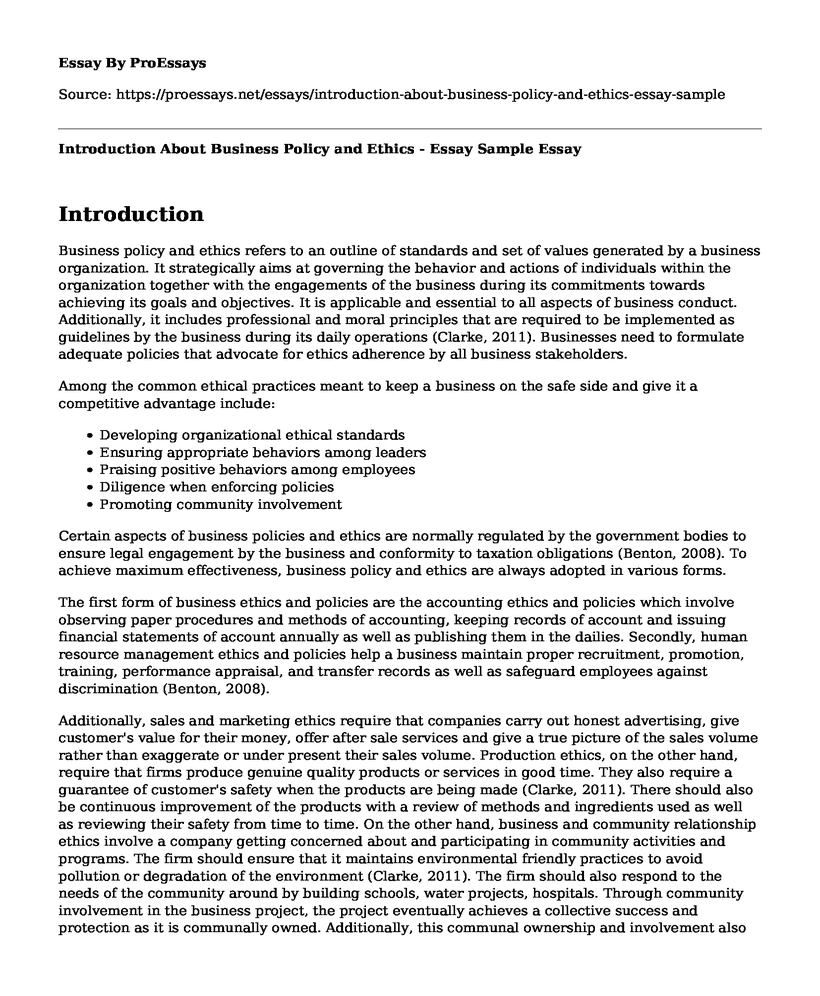Introduction
Business policy and ethics refers to an outline of standards and set of values generated by a business organization. It strategically aims at governing the behavior and actions of individuals within the organization together with the engagements of the business during its commitments towards achieving its goals and objectives. It is applicable and essential to all aspects of business conduct. Additionally, it includes professional and moral principles that are required to be implemented as guidelines by the business during its daily operations (Clarke, 2011). Businesses need to formulate adequate policies that advocate for ethics adherence by all business stakeholders.
Among the common ethical practices meant to keep a business on the safe side and give it a competitive advantage include:
- Developing organizational ethical standards
- Ensuring appropriate behaviors among leaders
- Praising positive behaviors among employees
- Diligence when enforcing policies
- Promoting community involvement
Certain aspects of business policies and ethics are normally regulated by the government bodies to ensure legal engagement by the business and conformity to taxation obligations (Benton, 2008). To achieve maximum effectiveness, business policy and ethics are always adopted in various forms.
The first form of business ethics and policies are the accounting ethics and policies which involve observing paper procedures and methods of accounting, keeping records of account and issuing financial statements of account annually as well as publishing them in the dailies. Secondly, human resource management ethics and policies help a business maintain proper recruitment, promotion, training, performance appraisal, and transfer records as well as safeguard employees against discrimination (Benton, 2008).
Additionally, sales and marketing ethics require that companies carry out honest advertising, give customer's value for their money, offer after sale services and give a true picture of the sales volume rather than exaggerate or under present their sales volume. Production ethics, on the other hand, require that firms produce genuine quality products or services in good time. They also require a guarantee of customer's safety when the products are being made (Clarke, 2011). There should also be continuous improvement of the products with a review of methods and ingredients used as well as reviewing their safety from time to time. On the other hand, business and community relationship ethics involve a company getting concerned about and participating in community activities and programs. The firm should ensure that it maintains environmental friendly practices to avoid pollution or degradation of the environment (Clarke, 2011). The firm should also respond to the needs of the community around by building schools, water projects, hospitals. Through community involvement in the business project, the project eventually achieves a collective success and protection as it is communally owned. Additionally, this communal ownership and involvement also encourage environmental protection efforts through proper disposal of waste materials together with engagement in activities that aims at conserving the natural environment such as planting of trees within the neighboring community (Benton, 2008). Further international business ethics require that a firm respects the cultural diversity employs internationally accepted business ethics, and updates itself on globalization and global standards. The business should respect the laws and policies outlined in the host country where they are conducting business.
Conclusion
In conclusion, policy and ethical principles require that a business and its stakeholders separate between wrong and right actions and eventually adopt the right choice of action. Unethical modes of conducts are easily identified within a business field and should be exposed to relevant punishment as outlined by the various legislations and business policies. For example, child Labor adoption is prohibited in business activities, unlawful use of materials or processes which are copyrighted together with engagement in bribery and corruption are not acceptable according to government legislation and can be punished through termination of the business license.
References
Benton, R. (2008). Business, Ethics, and the Environment: Imagining a Sustainable Future, by Joseph R. DesJardins. Upper Saddle River, N.J.: Pearson Prentice Hall, 2007. Business Ethics Quarterly, 18(04), 567-581. doi:10.1017/s1052150x00010071
Clarke, C. (2011). A System Approach to Implementing Business Ethics in the Corporate Workplace. Journal of Business Systems, Governance and Ethics, 6(2). doi:10.15209/jbsge.v6i2.200
Cite this page
Introduction About Business Policy and Ethics - Essay Sample. (2022, Dec 12). Retrieved from https://proessays.net/essays/introduction-about-business-policy-and-ethics-essay-sample
If you are the original author of this essay and no longer wish to have it published on the ProEssays website, please click below to request its removal:
- Course Work on Quality Management and Six Sigma
- Essay Sample on WCO SAFE Framework
- Essay Example on Promise-Keeping: Morally Crucial for Trust, Security and Character
- Essay Example on Drug Distribution System: Two Types of Drugs
- Brand Affects Consumers' Choices: What It Means to Adolescents - Essay Sample
- Organizational Readiness for Change Theory: Cybercrime Risks in Transport Sector - Essay Sample
- Paper Example on Growth of Businesses: Strategies to Achieve Successful Outcomes







